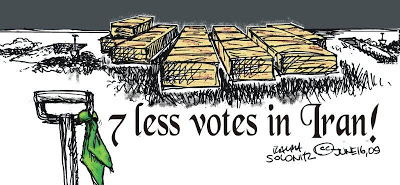Less than 24 hours after the largest demonstrations here since the 1979 revolution and the reported deaths of seven protesters, Iran’s Guardian Council said Tuesday it was prepared to order a recount of disputed ballots in Friday’s deeply divisive elections, but ruled out an annulment of the vote, according to state television and news reports. — New York Times.
Nine reasons why the results of the Iranian election seem fraudulent.
By Banafsheh Madaninejad / The Rag Blog / June 16, 2009
There have been many protests over the past three days within the Islamic Republic of Iran and an outpouring of support from Iranians and other outraged world citizens over the June 12, 2009, presidential election which may not have been fair and truly democratic.
In light of the great possibility that the elections in Iran were fraudulent, and in response to the ensuing crackdown on the population wanting an investigation of the results, a group of Iranian and non-Iranian students and concerned citizens of Austin and San Antonio are coming together to hold a demonstration and march at the Texas Capitol on Wednesday, June 17, 2009, at 5:00 p.m., in solidarity with the people of Iran.
The Iranian government is using brutal tactics to crack down on protesters, shutting down their means of communicating with each other (cell phones, and slowing down the internet so as to make it useless) and arresting leaders of the opposition. The universities have been closed down, party leaders have been detained. In the first hours of the massive march that took place Monday in 20 of the largest cities in Iran, spearheaded by Moussavi and Karroubi themselves, reports speak of 20 “leaders” already beaten and arrested and two people shot.
There are also reports of 17 students killed in the Tehran University dormitories on Sunday night, with eight deaths being confirmed so far. There is fighting in the streets and scenes that are reminiscent of the 1979 revolution. The event is being called the coup d’etat of 22 Khordad (June 12th).
Nine Reason why the results seem fraudulent:
1) The main challenger to Mr. Ahmedinejad, Mr. Mousavi’s vote count was consistently and almost exactly half that of Mr. Ahmadinejad’s during each incremental official announcement. This is highly unusual given the record of past elections.
2) In every single past election, each candidate has won his own province. This was not the case for either Mr. Karroubi or Mr. Moussavi on June 12.
3) The official government figures state that Mr. Moussavi has received around 34% of the votes. This result is dubious for various reasons. Throughout his campaign, Mr. Moussavi received the official support of the former reformist president Khatami, who resigned from candidacy to support Mr. Moussavi in this election. There is no evidence that Mr. Khatami, who won more than half the votes in both 1997 and 2001 has fallen this far from grace with the public.
4) The initial violent response to requests for a recount is itself, a possible indication of foul play by the incumbent.
5) Mr Karroubi, the other reformist candidate, ran on a progressive platform. And yet the official announced result for Mr. Karroubi was around 0.85%. Indeed, the figure is almost lower than the circulation number for his newspaper and almost twenty times lower than the number of votes that this candidate received in the 2005 election, when he was only 600,000 votes short of beating Mr. Ahmadinejad in the first round of the elections.
6) An open letter was written by a number of employees in the Interior Ministry (ministry in charge of election results), and issued about one week before the elections expressing worries that certain high officials in that ministry were planning to manipulate the election results.
7) Moreover, according to numerous official reports, many of the representatives of the two reform candidates were systematically and repeatedly prevented from being present at poll sites on election day, a right guaranteed by Iranian law.
8) Finally, a public and official statement issued by the Revolutionary Guards, the strong-arm of the conservative camp, charged Mr. Moussavi and Mr. Karroubi with the attempt to overthrow the Islamic Republic with a revolution. The letter explicitly threatened that the Guards would violently suppress any such movement before it is born.
9) The chief member of the Guardian Council, the official oversight body for the election, appointed by the Supreme Leader and naturally expected to remain impartial in the election process, on many occasions, publicly voiced his support for Mr. Ahmedinejad.
Rally and March to protest reelection of President Ahmadinejad and Iranian government’s crackdown on the opposition groups
Where: In front of Texas Capitol at 11th and Congress, Austin
When: 5:00 PM on Wednesday, June 17We ask participants to refrain from bringing any flags or using anti-regime slogans for the safety of those who plan to return to Iran for their professional lives. Let’s keep the efforts concentrated on the stolen election.
Sponsored by Iranians for Peace and Justice of UT, Austin Permanent Peace Protest, Persian Student Society of UT, and many other concerned UT Students and Austin citizens.
[Banafsheh Madaninejad, who teaches at the University of Texas at Austin, is a PhD candidate in the Program in Comparative Literature doing Islamic Studies. She was born in Abadan, Iran.]


















